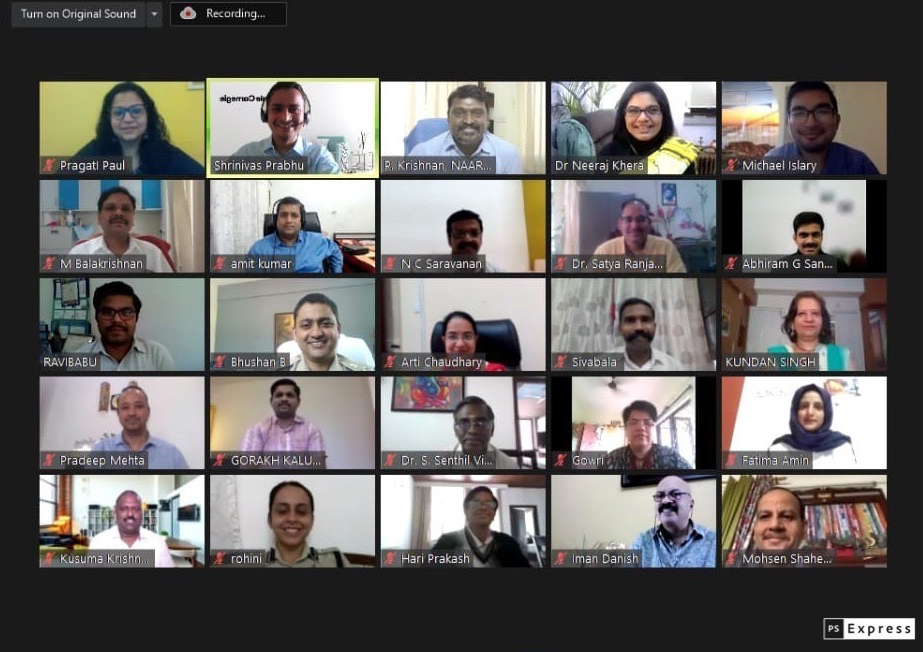14 May, 2021
The Indo-German Development Cooperation Project on “Human-Wildlife Conflict Mitigation in India’ aims at providing technical support at the national level and in selected partner states for effective implementation of human wildlife conflict mitigation measures. In this regard, Indira Gandhi National Forest Academy (IGNFA) and GIZ have entered into a Memorandum of Understanding for intensifying the training efforts on this issue.
Recognizing the crucial role that the national and state level training institutions play in facilitating competence development for effective and efficient HWC mitigation in India, the Project has prioritized the measures on developing competence of the trainers and faculty members of the selected training institutions from key sectors in India. The Project has engaged Dale Carnegie, for supporting in implementation of ‘Training of Trainers’ (ToT) events followed by faculty development support programme for participants.
In this context, a four-day ‘Training of Trainers for Effective delivery of courses on Holistic Approach to Human-Wildlife Conflict Mitigation’, was organised by IGNFA and GIZ from 11-14 May 2021 via online mode. The training was joined by 29 senior trainers and faculty members from nine premier national training institutes of India - Indira Gandhi National Forest Academy (IGNFA), Central Zoo Authority (CZA), National Academy of Agricultural Research Management -Indian Council of Agricultural Research (NAARM-ICAR), National Institute of Rural Development (NIRD), National Institute of Disaster Management (NIDM), Jamia Milia Islamia, Police Academy, Lal Bahadur Shastri National Academy of Administration (LBSNAA), and National Disaster Response Force (NDRF).

The ToT was delivered through experiential learning approach by providing opportunities and spaces to the participants to practice what was demonstrated. The ToT drew from the long-standing expertise and experience of trainers from Dale Carnegie and GIZ. The four-day training focused on effective delivery of courses on holistic approach to human-wildlife conflict mitigation in India. The following outcomes were expected from the training:
.png)
.png)
The first day of the ToT began with opening remarks from Mr P C Tyagi, Ex PCCF HOFF Tamil Nadu and Mr DVS Khati, Ex PCCF (WL) &CWW Uttarakhand shared their experiences on key issues on HWC including the drivers and pressures, impacts and key ongoing response processes at national, state and division levels in India. The second day focused on achieving training impacts, participatory approach to trainings, participatory training methods, facilitation and participant engagement for virtual delivery of trainings. The day was filled with discussions, demonstrations and experience-sharing among the selected group of trainers from the participating institutes. Day 3 focused on presenting with impact, and the group developed concrete ideas for collaborative trainings on HWC mitigation by the participating institutions. The ToT concluded on the fourth day with trainback sessions where participants delivered participatory training sessions, and committed to individual post-training goals.
.png)

.png)
.png)
*
The Human-Wildlife Conflict Mitigation (HWC) project is implemented by the Deutsche Gesellschaft für Internationale Zusammenarbeit (GIZ) GmbH on behalf of the German Federal Ministry for Economic Cooperation and Development (BMZ) in partnership with the Ministry of Environment, Forest and Climate Change, and State Forest Departments of Karnataka, Uttarakhand and West Bengal. The project aims at providing technical support at the national level, and effective implementation of HWC mitigation measures in selected states of India. The project pilot sites are: Haridwar Forest Division and adjoining landscape including Rajaji Tiger Reserve in Uttarakhand, Gorumara Wildlife Division in West Bengal, and Kodagu Forest Circle in Karnataka.
The main objective of the project is that the rural population in project areas, where agreed guidelines and tools are applied to mitigate human-wildlife conflict, is better protected against it. The project takes the approach of harmonious coexistence, by ensuring that both—human and wildlife—are protected from conflict. Read more
For more information contact: biodiv.india@giz.de
© 2014 IGBP. All Rights Reserved.
Site By: Virtualpages
